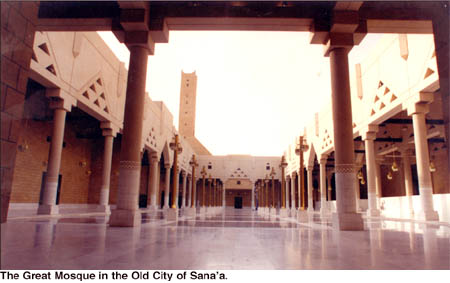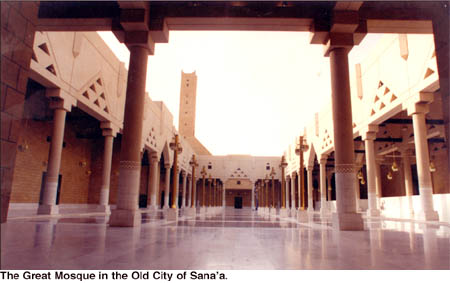
End vices, take on virtues Ramadhan: a month of training [Archives:2002/48/Culture]
November 25 2002

BY ABDUH M. ASSABRI
YEMEN TIMES STAFF
The blessed month of Ramadhan is a training period whereby Muslims are encouraged to do good deeds, and restrain from habitual and reprehensible deeds. Allah the Almighty has thus ordained special rewards for any good action or thought done during this month, encouraging us to excel in good actions and thoughts.
The virtues of fasting and other recommended actions by the Holy Prophet, Muhammad teaches Muslims how to put an end to vices, bad habits and faults in character, appreciate those virtues and get nearer to Allah. Hence during Ramadhan the following actions are carried out.
Five daily salaats are observed to remind and train the mindless Muslims that salaat is an all-time duty for them);
Zakat-Ul Fitr is paid on or before the ‘Id-Ul Fitr, the festival that commemorates the end of Ramadhan. Zakat-Ul Fitr is to teach Muslims to do sadaqah (charity), help less fortunate ones and to remind them that after Zakat-Ul Fitr, they should not forget to pay on time their annual divine obligatory Zakaat, which is the fourth pillar of Islam;
Tarawih and Tahajjud prayers are observed in the nights of Ramadhan;
Doubtful habits, such as smoking, are stopped. This is to train Muslims to be frugal as Allah hates extravagancy, and to save themselves from illnesses known to be associated with smoking and premature death;
Indecent videos/pictures are avoided. This is to free Muslims’ hearts and eyes from corruption and from Satan’s whisperings to do evil deeds;
Excessive intake of food is avoided. This keeps the stomach from being pot-bellied and distinguishes Muslims from kaafir whom Qur’an describes as those who eat for the sake of eating, ‘like cattle’ (Surrah 47:12)
All these good things which Ramadhan fast teaches Muslims are the means to attain piety. This is why the verse on Ramadhan fast says:
“O you who believe, fasting is prescribed for you… so that you will (learn how to attain) piety” (2:183)
Muslims are also to benefit from the voluntary congregational night prayers (Taraweeh)
The Blessed Month of Ramadhan is also marked with congregational optional daily prayers (Salaat-ul Taraweeh) after the Night Prayer (Salat-ul I’sha). The practice of performing Taraweeh was strongly encouraged but not ordered, as demonstrated by the hadith below, during Ramadhan by the Holy Prophet Muhammad.
Abu Hurayrah (r.a) relates that the Holy Prophet said: ‘Anybody who gets up to offer voluntary prayer during the month of Ramadhan with deep sense of belief and self-scrutiny will have his previous sins remitted.’ (Al-Bukhari and Muslim)
The virtues and importance of extra voluntary prayers (Taraweeh) during the month of Ramadhan, are established from the sayings and actions of the Holy Prophet . But during his lifetime, its observance as Taraweeh was not enforced so that the same may not become an obligatory duty.
After the passing away of the Holy Prophet, when there was no danger of its becoming a Fardh (compulsory act), Umar Farooq (r.a) with the agreement of pious companions introduced it as a voluntary prayer in congregation.
Muslims are also to reap the full reward of the Night of Power (Lailat-ut Qadr)
The last book of Allah to His creatures, Al-Qur’an, was revealed in the night of Ramadhan. What this means is that the first divine revelation to Prophet Muhammad took place in the Night of Ramadhan. Allah chose the night because of the special blessings in it. It is called the Night of Power (Lailat-ut Qadr) or the Night of Blessing (Lailat-ul Mubarak). The deed in this night is better than the rewards of deeds of 1,000 months (about 83.3 years).
It is this night that all Muslims are invited by Allah to look for in the month of Ramadhan. Specifically, the night is in the last ten days of Ramadhan and usually in one of the odd days. A Muslim is expected to perform naafilah, recite the Qur’an, do zikr and so on. Since no one knows precisely which of the odd days is the night, Muslims are expected to be in seclusion (itikaf) during the last 10 days of Ramadhan and the best place to do so is in the mosque.
‘A’ishah, may Allah be pleased with her, reported: Allah’s Messenger said: Look for Lailat-ul-Qadr in the last ten nights of Ramadhan. (Al-Bukhari)
‘A’ishah, may Allah be pleased with her, reported: When the last ten nights began Allah’s Messenger kept awake at night (for Prayer and devotion), wakened his family, and prepared himself to observe Prayer (with more vigor). (Al-Bukhari)
It should be mentioned that the Angels descend in succession during the night of Power and they go round with special greeting of “peace” till daybreak when they will move back to their position.
The number of these angels is uncountable and they descend with special command of Allah. The following chapter of the Qur’an details the event of the Night of Power:
“Indeed We have revealed it (Qur’an) in the Night of Power. And what will explain to you what the Night of Power is? The Night of Power is better than a thousand months. Therein descends the Angels and the Spirit by Allah’s permission, on every errand: (they say) Peace” till the rise of Morning!” (97:1-5)
Who will like to miss the Night after reading this description? It is this very reason that every Muslim wants to witness and reap its full blessing by fasting during the days of the month of Ramadhan. As Ramadhan fast is inextricably tied to the Night of Power (see 2:183) it follows that any Muslim who wishes to benefit from the Night of Power must fast during the month of Ramadhan. Qur’an says:
“Ramadhan is the (month) in which Qur’an was sent down, as a guide to mankind, and a clear guidance and judgement (so that mankind will distinguish right from wrong). Whoever among you witnesses the month of Ramadhan should fast through it…” (2:183)
——
[archive-e:48-v:2002-y:2002-d:2002-11-25-p:./2002/iss48/culture.htm]


